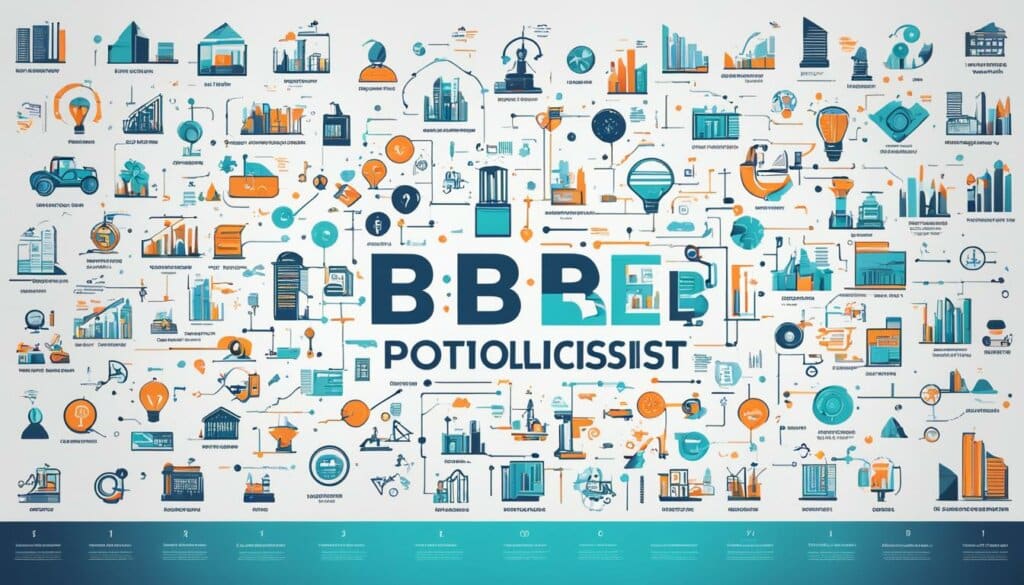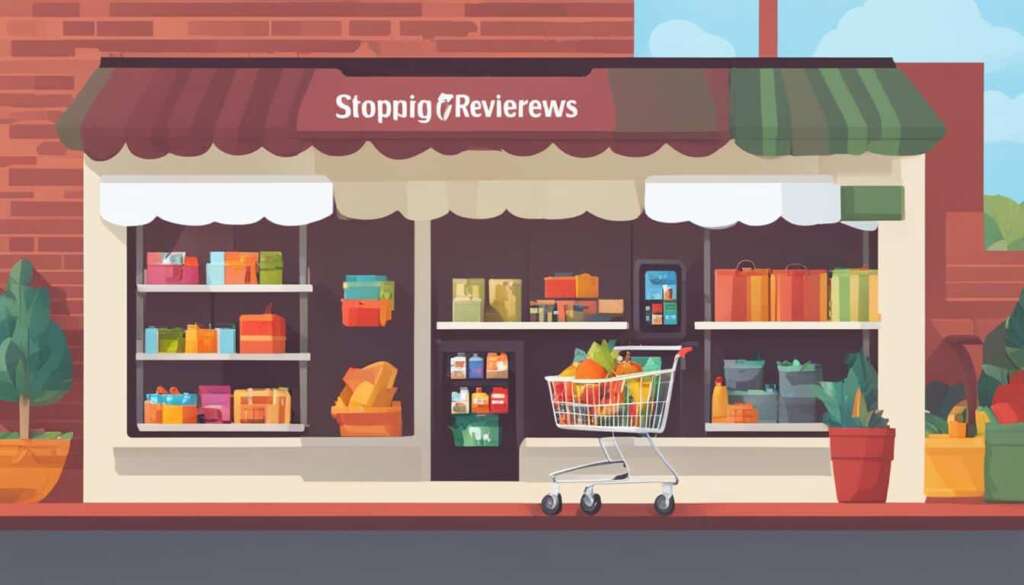Table of Contents
B2B e-commerce, also known as business-to-business electronic commerce, is a vital part of the modern business landscape. It involves the online exchange of products, services, or information between businesses, rather than between businesses and consumers. This form of commerce encompasses transactions between wholesalers, manufacturers, distributors, and other B2B sellers, facilitating the efficient flow of goods and services in the global market.
The concept of B2B e-commerce has gained significant momentum in recent years, with the global market projected to reach a staggering $20.9 trillion by 2027. This growth is driven by a compound annual growth rate (CAGR) of 17.5%, illustrating the increasing importance and widespread adoption of this business model. B2B transactions can take place on various platforms, including company websites, product supply and procurement exchanges, specialized industry portals, brokering sites, and information sites, making it a versatile and dynamic form of trade.
B2B enterprises also offer software solutions that enable businesses to build and manage their own B2B websites, facilitating seamless transactions and enhancing efficiency in the supply chain.
How Does B2B Work?
In B2B transactions, one business sells products or services to another business. This could involve a department within the buying business or the entire organization using the vendor’s products. B2B sales often require a buying committee, including a business decision-maker, technical decision-maker, and influencers.
In some cases, large purchases may involve a request for proposal (RFP) where vendors submit proposals with product details, terms, and pricing. This allows the buying committee to evaluate and compare different offerings before making a decision.
B2B sales are essential for businesses to acquire the necessary products and services to operate and grow. By establishing relationships and conducting transactions with other businesses, companies can access a wide range of resources, leverage specialized expertise, and meet their operational needs more efficiently.
B2B transactions involve selling products or services to other businesses, requiring a buying committee and often a request for proposal (RFP) process.
A buying committee typically consists of individuals from different departments or roles within the buying organization. The business decision-maker plays a crucial role in making final purchasing decisions. The technical decision-maker evaluates the technical aspects of the product or service and ensures compatibility with existing systems and processes. Influencers, on the other hand, may provide insights and recommendations based on their expertise or experiences.
The involvement of a buying committee helps to ensure that the purchasing decision is well-informed and considers the needs and requirements of various stakeholders within the buying organization. It also reduces the risk of relying solely on the judgment of a single individual.
Large purchases in B2B transactions often involve a request for proposal (RFP) process. Vendors submit comprehensive proposals that include details about their products or services, terms of the agreement, and pricing. The buying committee then evaluates the proposals, considering factors such as quality, pricing, and the vendor’s reputation, before making a decision.
Example Buying Committee in B2B Transactions:
- Business Decision-Maker: Vice President of Operations
- Technical Decision-Maker: IT Manager
- Influencers: Marketing Manager, Finance Manager
By understanding how B2B transactions work and the role of buying committees, businesses can effectively navigate the B2B marketplace, establish fruitful partnerships, and drive their growth and success.
Types of B2B Companies
In the world of B2B, there is a diverse range of companies that cater to different needs and industries. Let’s explore some examples of B2B companies that operate in various sectors:
1. Producers
Producers are B2B companies that design and manufacture their own products. They meticulously research, develop, and produce goods to meet the specific requirements of other businesses. From industrial equipment and machinery to innovative technologies, producers play a crucial role in providing businesses with the tools they need to thrive.
2. Retailers and Resellers
Retailers and resellers play a vital role in the B2B ecosystem by selling products made by other companies to businesses. They act as intermediaries, leveraging their market knowledge and distribution networks to connect manufacturers with their target customers. These companies ensure that products reach the intended audience efficiently and effectively.
3. Agencies and Consultants
Agencies and consultants provide specialized services and expert advice to businesses. These B2B companies offer valuable insights, strategic guidance, and creative solutions to help organizations achieve their goals. Whether it’s a marketing agency crafting impactful campaigns or a management consultant optimizing business processes, these companies contribute to the growth and success of their clients.
4. Distributors
Distributors are essential players in the B2B space. They handle multiple aspects of the supply chain, including packaging, shipping, and marketing on behalf of manufacturers. By leveraging their extensive networks and logistical capabilities, distributors ensure that products are delivered efficiently to businesses across various markets.
B2B companies operate across a wide range of industries, catering to the specific needs of different sectors. Some notable industries served by B2B companies include:
- Financial services
- Technology
- Manufacturing
- Construction
- Retail
- Telecommunications
- Insurance
- Healthcare
- Education
- Engineering
- Marketing and sales
- Real estate
- Food and beverage
These industries rely on B2B companies to provide the necessary products, services, and expertise to fuel their operations and drive growth.

Benefits of B2B E-commerce
B2B e-commerce offers several benefits that can significantly impact businesses. Let’s explore the advantages of conducting B2B transactions online:
1. Large Average Deal Size
One of the key advantages of B2B e-commerce is the potential for larger average deal sizes compared to B2C sales. B2B transactions often involve selling and buying in bulk, resulting in higher average transaction values. According to research, the average B2B transaction value is $491, compared to $147 for B2C transactions[1]. This larger deal size allows B2B companies to achieve greater revenue and profitability.
2. Higher Switching Costs
In B2B relationships, switching costs refer to the expenses and effort involved in changing suppliers or partners. B2B customer loyalty is generally higher compared to B2C due to the higher switching costs involved. Businesses often invest time and resources in developing relationships with trusted suppliers, making it less likely for them to switch to alternative options. This loyalty is driven by the satisfaction derived from the quality of products and services provided by B2B companies.
3. Larger Market Potential
B2B companies have a larger market potential compared to B2C businesses. B2B e-commerce allows businesses to target enterprises across industries and geographical locations. By expanding their reach, B2B companies can tap into a broader customer base and achieve significant growth.
4. Efficient Digital Transactions
B2B e-commerce enables faster and more efficient transactions through digital platforms. With integrated systems, businesses can handle complex orders, streamline processes, and ensure seamless coordination across different stages of the transaction. This efficiency leads to faster delivery of products and services to customers.
To summarize, B2B e-commerce offers benefits such as larger average deal sizes, higher customer loyalty due to switching costs, access to a larger market potential, and efficient digital transactions. By harnessing these advantages, B2B companies can drive growth, increase profitability, and stay competitive in the marketplace.
References:
- [1] Market Track. (2020). B2C and B2B eCommerce: Same, Same but Different. Retrieved from https://go.commercehub.com/rs/618-WHI-508/images/MarketTrack%202020%20B2C%20and%20B2B%20eCommerce%20Same%20Same%20but%20Different%20FINAL.pdf
B2B E-commerce Challenges
B2B e-commerce faces various challenges that organizations need to overcome in order to thrive in the digital marketplace. These challenges include:
- Long-term customer retention: Retaining customers in the B2B e-commerce space is a significant challenge. Unlike in B2C e-commerce, where individuals make frequent purchases, acquiring repeat business from B2B customers can be challenging. Businesses need to develop strategies to nurture relationships and encourage long-term customer loyalty.
- Price negotiation: B2B buyers typically have significant purchasing power and negotiate for better prices and additional services. This puts pressure on sellers to offer competitive pricing while maintaining profitability. Finding a balance between satisfying customers’ demands and the organization’s bottom line is essential.
- Intense competition: The B2B market is highly competitive, with numerous businesses vying for a limited number of customers. To stand out in this crowded landscape, organizations need to differentiate themselves through innovative products, superior customer service, and effective marketing strategies.
- Supply chain management: B2B e-commerce involves complex supply chain processes, especially when multiple partners are involved. Miscommunication, delays, and logistical challenges can arise, impacting the overall efficiency of the supply chain. Establishing robust supply chain management practices and leveraging technology can help alleviate these issues.
Addressing these challenges requires a strategic approach, proactive customer relationship management, streamlined operations, and the use of technology solutions tailored to B2B e-commerce needs.

| Challenges | Impact | Potential Solutions |
|---|---|---|
| Long-term customer retention | Decreased customer loyalty and repeat business | Nurture relationships, provide personalized experiences, and offer loyalty programs |
| Price negotiation | Potential impact on profitability | Employ dynamic pricing strategies, offer value-added services, and provide transparent pricing structures |
| Intense competition | Difficulty in attracting and retaining customers | Differentiate through unique value propositions, targeted marketing campaigns, and exceptional customer service |
| Supply chain management | Potential miscommunication and delays | Implement efficient supply chain processes, establish clear communication channels, and leverage technology for improved visibility and coordination |
Examples of B2B Companies
When it comes to B2B companies, there are several notable examples that have made a significant impact in the business world. Let’s explore a few of them:
Amazon B2B – Amazon Web Services (AWS)
Amazon, the renowned online marketplace, has ventured into the B2B space with Amazon Web Services (AWS). As one of the leading providers of cloud computing services, AWS serves businesses of all sizes, offering a wide range of scalable solutions to meet their IT infrastructure needs. With a global presence and a comprehensive suite of services, AWS has become a go-to choice for businesses seeking reliable and cost-effective cloud solutions.
Caterpillar B2B
Caterpillar is a prominent B2B company with specialization in manufacturing construction and mining equipment. Their products cater to other businesses in the industry, enabling them to enhance productivity and efficiency in their operations. With a rich history dating back to 1925, Caterpillar has established itself as a trusted brand, delivering high-quality equipment and innovative solutions to businesses worldwide.
Alibaba B2B
As one of the largest online commerce companies globally, Alibaba operates a thriving B2B marketplace. This platform connects buyers and sellers from around the world, facilitating B2B transactions across various industries. With a wide range of product categories and a robust infrastructure, Alibaba provides an efficient and convenient avenue for businesses to connect, collaborate, and trade on a global scale.
Quill (Staples)
Quill, owned by Staples, is a notable B2B e-commerce company specializing in office supplies. With a focus on serving small and midsize businesses, Quill offers an extensive range of products, including stationery, furniture, electronics, and breakroom essentials. Their online platform provides a seamless purchasing experience, enabling businesses to conveniently source their office supplies and streamline their procurement processes.
Upwork
Upwork is a leading freelance job marketplace that connects businesses with talented professionals across various fields. As a B2B platform, Upwork allows businesses to find skilled freelancers for different projects, ranging from design and programming to writing and marketing. The platform offers a simplified hiring process, enabling businesses to leverage a flexible workforce and access specialized expertise.
| Company | Description |
|---|---|
| Amazon B2B – Amazon Web Services (AWS) | Leading provider of cloud computing services. |
| Caterpillar B2B | Manufacturer of construction and mining equipment. |
| Alibaba B2B | Operator of a global B2B marketplace. |
| Quill (Staples) | B2B e-commerce company selling office supplies. |
| Upwork | Freelance job marketplace connecting businesses with professionals. |
These examples showcase the diverse range of B2B companies and their contributions to the business landscape. From technology services to manufacturing and online marketplaces, B2B companies play a vital role in facilitating efficient commerce and driving innovation.
B2B E-commerce: Learn Everything You Need to Know
Welcome to the comprehensive guide to B2B e-commerce. In this section, we will explore the different types of B2B e-commerce, delve into the stages of a B2B business, discuss effective marketing tactics, debunk common misconceptions, and highlight the advantages of using a B2B e-commerce platform. Additionally, we will examine successful B2B e-commerce examples and provide insights into the future trends shaping the B2B e-commerce landscape.
Types of B2B E-commerce
Understanding the various types of B2B e-commerce is crucial for businesses aiming to establish a strong online presence. Here are some common types:
- Direct B2B E-commerce: In this model, businesses sell their products directly to other businesses through online platforms or dedicated websites.
- B2B E-commerce Marketplace: These platforms bring together multiple sellers and buyers, facilitating transactions and providing a broad range of options to choose from.
- Supply Chain B2B E-commerce: This type of B2B e-commerce focuses on the efficient management of the supply chain process, including procurement, inventory management, and order fulfillment.
- Vertical B2B E-commerce: Vertical B2B e-commerce platforms cater to specific industries or niches, offering industry-specific solutions and services.
Stages of a B2B Business
A B2B business goes through various stages during its lifecycle. Here’s an overview:
- Establishment: In the early stages, businesses focus on setting up their infrastructure, identifying their target market, and building partnerships.
- Growth: This stage involves expanding the customer base, increasing sales, and optimizing operations to meet growing demand.
- Maturity: At this stage, the business has achieved stability and continues to maintain and grow its customer base through consistent product quality and customer service.
- Diversification: Businesses in the diversification stage explore new markets, introduce new products or services, and expand their offerings to stay competitive.
B2B E-commerce Marketing Tactics
Marketing plays a crucial role in the success of any B2B e-commerce venture. Here are some effective marketing tactics to consider:
- Content Marketing: Create valuable and informative content such as blog posts, whitepapers, and case studies to establish thought leadership and attract potential customers.
- Email Marketing: Utilize targeted email campaigns to engage existing customers, nurture leads, and provide personalized offers.
- Social Media Marketing: Use social media platforms to build brand awareness, share industry insights, and engage with potential customers.
- Search Engine Optimization (SEO): Optimize your website’s content and structure to improve visibility in search engine results and drive organic traffic.
- Pay-Per-Click (PPC) Advertising: Launch targeted PPC campaigns to increase visibility, drive traffic, and generate leads.
Common Misconceptions about B2B E-commerce
“B2B e-commerce is only suitable for large enterprises.”
“B2B e-commerce eliminates the need for sales representatives.”
“Implementing a B2B e-commerce platform is complex and expensive.”
These misconceptions often hinder businesses from embracing the full potential of B2B e-commerce. In reality, B2B e-commerce is suitable for businesses of all sizes, sales representatives remain crucial for building relationships and closing deals, and implementing a B2B e-commerce platform can be cost-effective and streamlined.
Advantages of Using a B2B E-commerce Platform
Utilizing a B2B e-commerce platform offers several advantages for businesses:
- Streamlined Sales Process: B2B e-commerce platforms automate various aspects of the sales process, from order placement to payment processing, reducing manual errors and increasing efficiency.
- Enhanced Customer Experience: Online platforms provide customers with ease of access, personalized product recommendations, and self-service functionalities, improving overall satisfaction.
- Increased Market Reach: B2B e-commerce platforms enable businesses to reach a global audience, expand into new markets, and connect with potential customers beyond geographical boundaries.
- Improved Analytics and Insights: These platforms offer comprehensive analytics and reporting tools, providing valuable insights on customer behavior, sales trends, and other key metrics for data-driven decision-making.
Successful B2B E-commerce Examples
Here are some notable examples of successful B2B e-commerce platforms:
| Company | Description |
|---|---|
| Amazon Business | Amazon’s B2B platform that provides a wide range of products to businesses, including bulk purchasing options and exclusive business features. |
| Alibaba.com | One of the world’s largest B2B marketplaces, connecting businesses globally and offering a vast selection of products. |
| SAP Ariba | A cloud-based procurement platform that allows businesses to connect with suppliers, streamline procurement processes, and manage the entire source-to-pay cycle. |
| Shopify Plus | A scalable e-commerce platform designed specifically for B2B businesses, offering features such as wholesale pricing, custom catalogs, and multiple sales channels. |
Future Trends in B2B E-commerce
The landscape of B2B e-commerce continues to evolve, and businesses must stay informed about emerging trends to stay ahead. Here are some future trends to watch:
- Mobile B2B E-commerce: The increasing use of mobile devices will drive the growth of mobile-friendly B2B e-commerce platforms and apps.
- Personalization: Businesses will focus on providing personalized experiences through targeted product recommendations, tailored pricing, and customized user interfaces.
- Artificial Intelligence (AI) and Machine Learning (ML): AI and ML technologies will be leveraged to automate processes, analyze customer data, and enhance predictive analytics.
- Blockchain Technology: The adoption of blockchain technology will improve transparency, security, and traceability in B2B transactions.
By understanding the different types of B2B e-commerce, implementing effective marketing tactics, dispelling common misconceptions, and leveraging the advantages of a B2B e-commerce platform, businesses can navigate the ever-changing landscape of wholesale trade online and thrive in the B2B e-commerce realm.
Conclusion
B2B e-commerce plays a crucial role in modern business, facilitating the exchange of goods, services, and information among businesses. In today’s digital economy, where customer expectations continue to rise, B2B companies must embrace e-commerce to stay competitive and meet evolving demands. Despite the challenges it presents, B2B e-commerce offers significant benefits, including larger average deal sizes, increased customer loyalty, and access to a vast market potential.
By understanding the mechanisms of B2B e-commerce and leveraging the right tools and strategies, businesses can thrive in the era of wholesale trade online. B2B transactions empower companies to conduct seamless and efficient trade, leading to enhanced productivity and growth. Through digital platforms and integrated systems, B2B e-commerce enables faster delivery times and facilitates the handling of complex orders.
As the world becomes increasingly interconnected, B2B e-commerce will continue to shape the future of global trade. It provides opportunities for businesses across industries to connect, collaborate, and expand their networks. The potential for large-scale collaborations and innovative partnerships allows B2B companies to scale quickly and explore new market segments. In summary, B2B e-commerce is a vital tool that empowers businesses to navigate the dynamic landscape of wholesale trade and seize growth opportunities.
FAQ
What is B2B e-commerce?
B2B e-commerce refers to the exchange of products, services, or information between businesses rather than between businesses and consumers. It involves online transactions between wholesalers, manufacturers, distributors, and other B2B sellers.
How does B2B work?
In B2B transactions, one business sells products or services to another business. This could involve a department within the buying business or the entire organization using the vendor’s products. B2B sales often require a buying committee, including a business decision-maker, technical decision-maker, and influencers.
What are the types of B2B companies?
There are various types of B2B companies, including producers who design and manufacture their own products, retailers and resellers who sell products made by other companies, agencies and consultants who provide services and advice to businesses, and distributors who handle packaging, shipping, and marketing for manufacturers.
What are the benefits of B2B e-commerce?
B2B e-commerce offers several benefits, including the potential for larger average deal sizes compared to B2C sales. B2B transactions often involve selling and buying in bulk, resulting in higher average transaction values. B2B customer loyalty is also higher due to higher switching costs and the satisfaction derived from the product and services provided.
What challenges does B2B e-commerce face?
B2B e-commerce faces challenges such as long-term customer retention, as businesses often find it difficult to convince buyers to make repeat purchases. The B2B market is also limited in size compared to the B2C market, making it more competitive. B2B buyers typically negotiate for better prices and extra services due to their bulk purchasing power.
Can you provide examples of B2B companies?
Examples of B2B companies include Amazon, which has a B2B business called Amazon Web Services (AWS) providing cloud computing services to businesses. Caterpillar is another B2B company that manufactures construction and mining equipment, selling them to other businesses. Alibaba operates a B2B marketplace where buyers and sellers can connect and transact business. Quill, owned by Staples, is a B2B e-commerce company selling office supplies to small and midsize businesses. Upwork is a job search platform connecting freelancers with employers for various projects.
Where can I learn more about B2B e-commerce?
The comprehensive guide to B2B e-commerce provides information on its different types, stages of a B2B business, marketing tactics, common misconceptions, and the advantages of using a B2B e-commerce platform. It also delves into successful B2B e-commerce examples and the future trends in B2B e-commerce.













